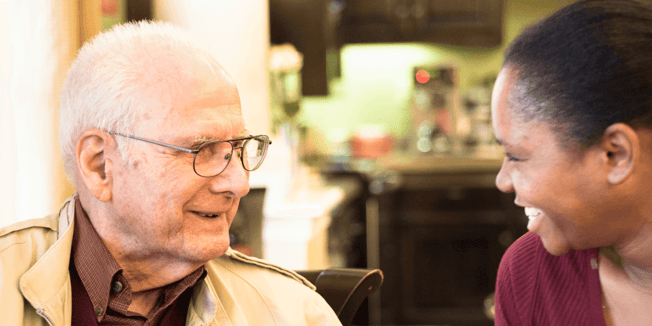How Memory Care Enhances Cognitive Health for Seniors
Memory Care Explained: Comprehending Provider That Make a Difference
Memory care services have arised as a vital source for individuals coming to grips with cognitive problems, such as Alzheimer's and dementia. These specific programs not just give safe environments and skilled team but likewise include customized tasks that enhance cognitive interaction and psychological health. Understanding the range of therapies and support group offered is essential for families steering via these facility choices. As we explore the various parts that add to reliable memory care, it ends up being clear that the ideal selections can greatly impact the high quality of life for both citizens and their families.
Summary of Memory Care

Specialized Therapies Available
A number of specialized treatments are offered within memory care solutions, each tailored to deal with the special obstacles encountered by people with cognitive disabilities. These therapies aim to enhance cognitive performance, advertise psychological health, and enhance general high quality of life.One favored approach is memory treatment, which motivates individuals to review previous experiences with photos, music, and acquainted things. This technique can evoke memories, promote discussion, and foster links with caregivers and peers.Another effective treatment is cognitive excitement therapy (CST), created to engage people in psychological exercises that advertise cognitive abilities and social communication. CST sessions usually entail challenges, quizzes, and conversations, offering structured cognitive obstacles that aid maintain mental agility.Art and music treatment are also integral components of memory care. These treatments utilize innovative expression to help with interaction and psychological release, usually benefiting those who may battle with verbal communication.Additionally, animal-assisted treatment has obtained recognition for its ability to decrease anxiety and promote social communication with the visibility of therapy pets. Jointly, these specialized treatments play an essential function in boosting the lives of individuals with memory problems, fostering an encouraging and enriching setting.
Engaging Activities and Programs
Involving activities and programs play an important function in memory care solutions, offering individuals boosting opportunities that promote cognitive involvement and social interaction. Tailored to the one-of-a-kind needs of citizens, these tasks include arts and crafts, music therapy, memory video games, and workouts. Such programs are created not just to enhance cognitive function however likewise to foster a sense of success and community (Memory Care Charlotte).Social communication is a critical element of memory care, as it helps in reducing feelings of seclusion and clinical depression typically experienced by people with memory impairments. Group activities urge interaction and cooperation, producing a setting where locals can share experiences and construct relationships.Moreover, engaging tasks can be adjusted to varying levels of cognitive ability, guaranteeing that all individuals can take part meaningfully. Personnel learnt memory care promote these programs, giving assistance and inspiration tailored to each individual's capabilities.Incorporating familiar routines and interests into these activities can even more improve their efficiency, assisting locals get in touch with their past and preserve a sense of identity. Generally, a well-shaped selection of interesting tasks enhances the lives of those in memory care, contributing to their general well-being and quality of life
Significance of Family Assistance

Choosing the Right Facility
Choosing the ideal memory care facility is an important choice that needs careful consideration of various variables. Initially, examine the degree of care your liked one needs. Facilities differ in their offerings, from standard support to specialized memory care programs basics customized for problems such as Alzheimer's and other dementias.Next, think about the environment of the center. A welcoming, secure, and comfy ambience can considerably affect a citizen's wellness. Go to capacity facilities to assess their sanitation, safety and security features, and general ambiance. Observe staff interactions with homeowners, as caring and trained caretakers are essential to high quality care.Additionally, inquire regarding the center's staffing proportions and credentials. Boutique Memory Care Charlotte. Enough staffing assurances personalized interest and prompt reactions to citizens' demands. Review the accessibility of tasks and programs that promote interaction, socialization, and cognitive stimulation, as these are crucial for maintaining quality of life
Regularly Asked Concerns
What Is the Cost of Memory Care Providers?
The cost of memory care services differs considerably based on area, center kind, and level of care needed. Usually, families can anticipate to pay in between $4,000 and $7,000 per month - Dementia Care. These expenditures commonly encompass housing, meals, personal care, and specialized support for memory-related conditions. It is necessary for households to research choices thoroughly and think about economic support programs, insurance coverage, and possible lasting care planning to manage these costs efficiently

How Is Team Educated to Deal With Memory Care Residents?
Team training for memory care homeowners is detailed and specialized, concentrating on recognizing the special demands of individuals with cognitive problems. Programs generally include education and learning on dementia-related conditions, interaction techniques, habits management, and emotional assistance strategies. Training likewise emphasizes the value of developing a safe and revitalizing setting. Recurring education and hands-on experience warranty staff are furnished to provide caring care, cultivating self-respect and respect for citizens while promoting their general health.
Are Memory Care Facilities Licensed and Regulated?
Yes, memory care facilities undergo licensing and regulatory oversight, which varies by state - Dementia Care. These laws assure that centers meet certain criteria associated with safety, care high quality, staffing, and resident legal rights. Commonly, state health departments or regulative bodies carry out examinations and monitor compliance to protect locals with memory disabilities. Possible citizens and family members need to validate a center's licensing standing and governing background to identify ample care and support services are offered
Can Locals Personalize Their Living Spaces?
Yes, residents in memory care facilities often have the opportunity to personalize their living spaces. This personalization may consist of picking designs, setting up furniture, or displaying individual items, which can aid develop a feeling of experience and comfort. Such customization is urged to advertise uniqueness and enhance the emotional well-being of homeowners. Nonetheless, any changes are normally based on center guidelines to guarantee safety and security and keep a helpful environment for all homeowners.
What Are the Seeing Hours for Household Members?
Checking out hours for relative are generally developed to guarantee that citizens receive ideal care while maintaining significant connections with their enjoyed ones. These hours may differ by facility, yet typically, visitation is permitted throughout designated times, commonly in the afternoon and very early evening. Alzheimer’s Care. It is a good idea for family members to validate particular going to hours with the center to ensure conformity with any policies in location, as well as to boost the overall experience for both citizens and site visitors